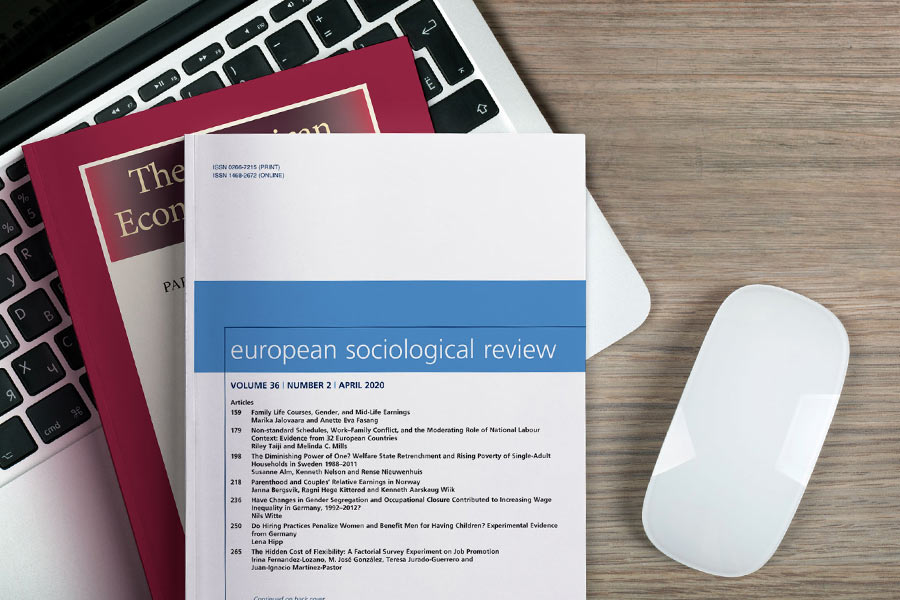Total hits 17.297
-
PASS-Befragungsdaten verknüpft mit administrativen Daten des IAB (PASS-ADIAB) 1975-2018
Dummert, S. & Zimmermann, F. (2020): PASS-Befragungsdaten verknüpft mit administrativen Daten des IAB (PASS-ADIAB) 1975-2018. (FDZ-Datenreport 09/2020 (de)), Nürnberg, 79 p. DOI:10.5164/IAB.FDZD.2009.de.v1
-
Street-level judgements about welfare deservingness
Senghaas, M. (2021): Street-level judgements about welfare deservingness. How jobcentre advisors decide about the individual mix of ‘support’ and ‘demand’ in the delivery of activation policies. In: Social Policy and Society, Vol. 20, No. 3, p. 385-399. DOI:10.1017/S1474746420000408
-
Fünf Jahre "Wir schaffen das" - Eine Bilanz aus der Perspektive des Arbeitsmarktes
Brücker, H., Fendel, T., Guichard, L., Gundacker, L., Jaschke, P., Keita, S., Kosyakova, Y. & Vallizadeh, E. (2020): Fünf Jahre "Wir schaffen das" - Eine Bilanz aus der Perspektive des Arbeitsmarktes. (IAB-Forschungsbericht 11/2020), Nürnberg, 65 p.
-
Technical report on the IAB Establishment
Bechmann, S., Tschersich, N., Ellguth, P., Kohaut, S., Baier, E. & Bogner, M. (2020): Technical report on the IAB Establishment. Panel wave 26 (2018). (FDZ-Methodenreport 02/2020 (en)), Nürnberg, 39 p. DOI:10.5164/IAB.FDZM.2002.en.v1
-
Technical report on the IAB Establishment : panel wave 26 (2018)
Bechmann, S., Tschersich, N., Ellguth, P., Kohaut, S. & Baier, E. (2020): Methoden- und Feldbericht zum IAB-Betriebspanel. Welle 26 (2018). (FDZ-Methodenreport 02/2020 (de)), Nürnberg, 38 p. DOI:10.5164/IAB.FDZM.2002.de.v1
-
Die Auswirkungen der Coronakrise auf die Arbeitsmarktchancen der Corona-Abiturjahrgänge
Anger, S. & Sandner, M. (2020): Die Auswirkungen der Coronakrise auf die Arbeitsmarktchancen der Corona-Abiturjahrgänge. In: Ifo-Schnelldienst, Vol. 73, No. 9, p. 3-7.
-
Secure Matrix Computation: A Viable Alternative to Record Linkage?
Drechsler, J. & Klein, B. (2020): Secure Matrix Computation: A Viable Alternative to Record Linkage? In: J. Domingo-Ferrer & K. Muralidhar (Hrsg.) (2020): Privacy in Statistical Databases, Cham, p. 240-254. DOI:10.1007/978-3-030-57521-2_17
-
Kurzstudie zur Bedeutung von Grenzpendelnden für den sächsischen Arbeitsmarkt
Sujata, U., Weyh, A. & Zillmann, M. (2020): Kurzstudie zur Bedeutung von Grenzpendelnden für den sächsischen Arbeitsmarkt. (IAB-Regional. Berichte und Analysen aus dem Regionalen Forschungsnetz. IAB Sachsen 03/2020), Nürnberg, 14 p.
-
Training, wages and a missing school graduation cohort
Dorner, M. & Görlitz, K. (2020): Training, wages and a missing school graduation cohort. (IAB-Discussion Paper 28/2020), Nürnberg, 40 p.
-
Corona, Strukturwandel und Arbeitsmarkt
Weber, E. (2020): Corona, Strukturwandel und Arbeitsmarkt. In: Ifo-Schnelldienst, Vol. 73, No. 9, p. 17-19.
-
Applying data synthesis for longitudinal business data across three countries
Alam, M., Dostie, B., Drechsler, J. & Vilhuber, L. (2020): Applying data synthesis for longitudinal business data across three countries. In: Statistics in transition, Vol. 21, No. 4, p. 212-236. DOI:10.21307/stattrans-2020-039
-
Do Unions and Works Councils Really Dampen the Gender Pay Gap?
Oberfichtner, M., Schnabel, C. & Töpfer, M. (2020): Do Unions and Works Councils Really Dampen the Gender Pay Gap? Discordant Evidence from Germany. In: Economics Letters, Vol. 196. DOI:10.1016/j.econlet.2020.109509
-
Psychische Probleme von Menschen im SGB II: Was Fachkräfte im Jobcenter tun, um diese zu erkennen
Oschmiansky, F. & Popp, S. (2020): Psychische Probleme von Menschen im SGB II: Was Fachkräfte im Jobcenter tun, um diese zu erkennen. In: IAB-Forum No. 14.09.2020 Nürnberg, o. Sz.
-
Homeoffice braucht klare Regeln (Serie "Corona-Krise: Folgen für den Arbeitsmarkt")
Bellmann, L. & Hübler, O. (2020): Homeoffice braucht klare Regeln (Serie "Corona-Krise: Folgen für den Arbeitsmarkt"). In: IAB-Forum No. 11.09.2020 Nürnberg, o. Sz.
-
Employment Subsidies for Long-Term Welfare Benefits Recipients: Reconciling Programmes Goals with Needs of Diverging Population Groups
Nivorozhkin, A. & Promberger, M. (2020): Employment Subsidies for Long-Term Welfare Benefits Recipients: Reconciling Programmes Goals with Needs of Diverging Population Groups. (IAB-Discussion Paper 27/2020), Nürnberg, 34 p.
-
Recruiting Intensity and Hiring Practices: Cross-Sectional and Time-Series Evidence
Lochner, B., Merkl, C., Stüber, H. & Gürtzgen, N. (2020): Recruiting Intensity and Hiring Practices: Cross-Sectional and Time-Series Evidence. (IZA discussion paper 13678), Bonn, 31 p.
-
The Administrative Wage and Labor Market Flow Panel Extension for the IAB Job Vacancy Survey 2010 - 2014
Stüber, H., Seth, S. & Lochner, B. (2020): The Administrative Wage and Labor Market Flow Panel Extension for the IAB Job Vacancy Survey 2010 - 2014. (FDZ-Datenreport 08/2020 (en)), Nürnberg, 23 p. DOI:10.5164/IAB.FDZD.2008.en.v1
-
The Administrative Wage and Labor Market Flow Panel Extension for the IAB Establishment Panel 1993 - 2014
Stüber, H., Seth, S. & Stegmaier, J. (2020): The Administrative Wage and Labor Market Flow Panel Extension for the IAB Establishment Panel 1993 - 2014. (FDZ-Datenreport 07/2020 (en)), Nürnberg, 24 p. DOI:10.5164/IAB.FDZD.2007.en.v1
-
Dismissal Protection and Long-Term Sickness Absence - First Evidence from Germany
Gürtzgen, N. & Hiesinger, K. (2020): Dismissal Protection and Long-Term Sickness Absence - First Evidence from Germany. (ZEW discussion paper 2020-040), Mannheim, 51 p.
-
Grenzpendler aus Polen in Berlin-Brandenburg
Seibert, H. & Wiethölter, D. (2020): Grenzpendler aus Polen in Berlin-Brandenburg. (IAB-Regional. Berichte und Analysen aus dem Regionalen Forschungsnetz. IAB Berlin-Brandenburg 01/2020), Nürnberg, 27 p.



